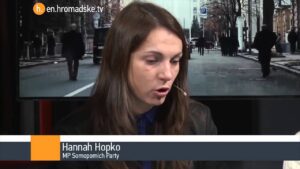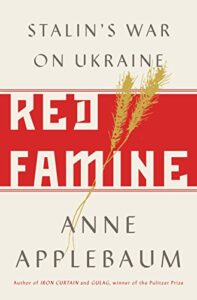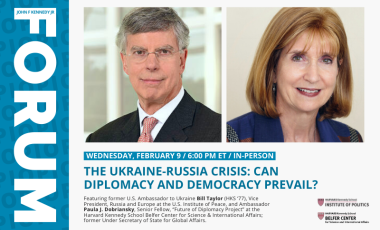While the world’s eyes are on the diplomatic surge trying to head off a Russian invasion of Ukraine, WBUR reports, for Ukrainians themselves, there’s also something else — the feeling of a nation being reborn.
“Putin is always trying to say that Ukraine is a failed state, Ukraine is an artificial state,” says Hanna Hopko, a former Ukrainian member of parliament. “But Ukraine is a democracy in action.”
 For centuries, Ukraine has been a pawn in great power competitions. This time, Ukrainians say it’s different, experts suggest.
For centuries, Ukraine has been a pawn in great power competitions. This time, Ukrainians say it’s different, experts suggest.
“This crisis galvanized, consolidated, accelerated the development of this new civic identity, where folks who never in their lives spoke Ukrainian all of a sudden made a conscious choice to make an effort to start speaking Ukrainian in public,” Vitaly Chernetsky, a professor of Slavic languages at the University of Kansas, says.
Today’s Ukraine crisis is entirely fabricated, according to Damon Wilson, President and CEO of the National Endowment for Democracy (NED). Putin recognizes that if freedom and democracy succeed in Ukraine—or Georgia or Belarus—that if they follow the wildly successful path of the Baltic states, it is only a matter of time until the Russian people demand more for themselves, he told the launch meeting (above, from 4.25) of a new Atlantic Council analysis, Thwarting Kremlin aggression today for constructive relations tomorrow.
 “The warning signs were ample,” read the opening lines of Anne Applebaum’s book, Red Famine, about the Holodomor – deliberately engineered by Soviet Russia (see below) – in which at least 3.5 million Ukrainians perished, said Wilson. Similarly, today we should have taken heed of earlier Russian aggression in Georgia and eastern Ukraine.
“The warning signs were ample,” read the opening lines of Anne Applebaum’s book, Red Famine, about the Holodomor – deliberately engineered by Soviet Russia (see below) – in which at least 3.5 million Ukrainians perished, said Wilson. Similarly, today we should have taken heed of earlier Russian aggression in Georgia and eastern Ukraine.
But adopting a geopolitical perspective, simplifying strategic responses to the crisis as hawks vs doves is “intellectually lazy,” he added. We should put the people of both Ukraine and Russia “front and center,” especially given the resistance evident in the popular mobilization of Ukraine’s resilient civil society – the determination and ingenuity of which is “the success story of the country’s uneven democratic record.”
Russian media are spreading disinformation about US bioweapons as troops mass near Ukraine, according to reports.
Misinformation campaigns “are really dangerous to democracy because we were not built for monolithic decision-making at the executive level,” says Justin Pelletier, a professor of practice at the Rochester Institute of Technology’s Global Cybersecurity Institute. “Manipulating public opinion can be a way to delay response—it creates a space of freedom for [more repressive regimes] to maneuver within.”
Scientific American spoke with Pelletier about the roles that misinformation, and cyberattacks more broadly, are playing in the conflict between Russia and Ukraine and how these techniques differ from those used in conventional warfare. RTWT
Cyberattack Misinformation Could Be Plan for Ukraine Invasion, @Jpell915 , a professor of practice at the Rochester Institute of Technology’s Global Cybersecurity Institute, tells @sciam https://t.co/Mw5KFK1tTR
— Democracy Digest (@demdigest) February 9, 2022
And when it comes to narrative and discourse control, Stanford’s Michael McFaul observes (below), “We hear about ‘NATO expansion’ all the time. But who is hearing much about [Russia’s] ‘annexation’ [of] Crimea, or South Ossetia?” [HT: NED Forum’s @KShieves].
Great point by @McFaul on Russia’s narrative and discourse control. “We hear about ‘NATO expansion’ all the time. But who is hearing much about ‘annexation,’ Crimea, or South Ossetia?” https://t.co/NXwmWjcXoI
— Kevin Sheives (@KSheives) February 9, 2022
Does a democratically governed country have the right to exist? What role does the rest of the world play in supporting that right? And what important international conflicts and diplomatic efforts aren’t we talking about with the global spotlight on Eastern Europe?
Join Bill Taylor, Vice President, Russia and Europe at the U.S. Institute of Peace and former National Endowment for Democracy (NED) board member Ambassador Paula J. Dobriansky, former Under Secretary of State for Global Affairs, for a conversation on the unfolding conflict and America’s role in defending democracy abroad.
 The Ukraine-Russia Crisis: Can Diplomacy and Democracy Prevail? Wed., Feb. 9, 2022 | 6:00pm – 7:00pm. Please click here to RSVP.
The Ukraine-Russia Crisis: Can Diplomacy and Democracy Prevail? Wed., Feb. 9, 2022 | 6:00pm – 7:00pm. Please click here to RSVP.
Why is Ukraine’s success a threat to some and can Ukraine’s democratic advancement set an example for other nations? IFES asks. What needs to be done to protect Ukraine from the authoritarian playbook of equating democracy to chaos? Why is it important to maintain Ukraine’s democratic momentum from a global perspective and what needs to happen to ensure this?
Defending Democracy in Ukraine = Defending Democracy Everywhere
Feb. 24 at 9:00-10:15 a.m. EST/UTC-5 or 15:00-16:15 CET/UTC+1 or 16:00-17:15 EET/UTC+2
Moderator: Dr. Magnus Öhman, Senior Political Finance Adviser and Regional Europe Office Director, IFES. Learn more and RSVP.
The recently released movie “Mr. Jones” revisits British journalist Gareth Jones’s experiences in Soviet Ukraine, exposing the horrors of the famine and the cynicism of the cover-up.







